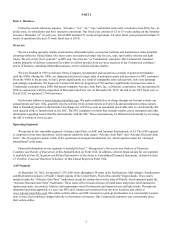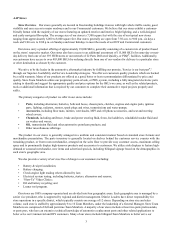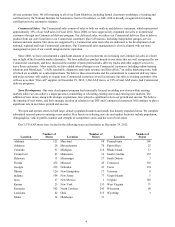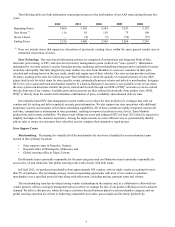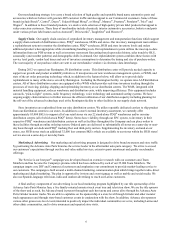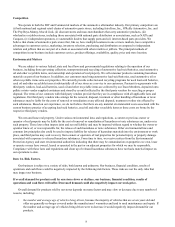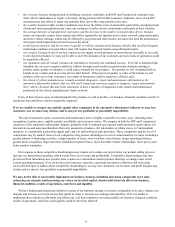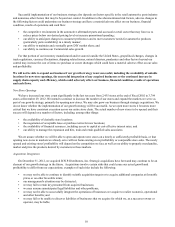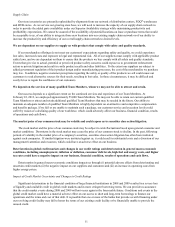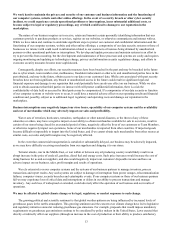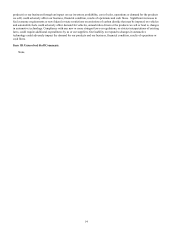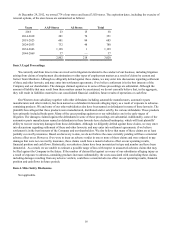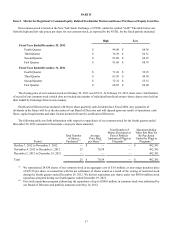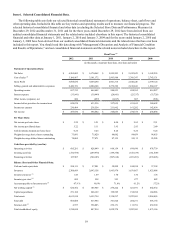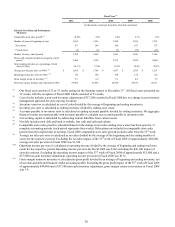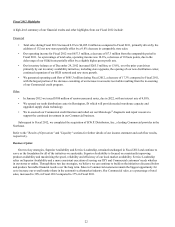Advance Auto Parts 2012 Annual Report Download - page 19
Download and view the complete annual report
Please find page 19 of the 2012 Advance Auto Parts annual report below. You can navigate through the pages in the report by either clicking on the pages listed below, or by using the keyword search tool below to find specific information within the annual report.12
Our overall credit rating may be negatively impacted by deteriorating and uncertain credit markets or other factors which
may or may not be within our control. The interest rates on our publicly issued debt and revolving credit facility are linked
directly to our credit ratings. Accordingly, any negative impact on our credit rating would likely result in higher interest rates
and interest expense on any borrowings under our revolving credit facility or from future issuances of public debt and less
favorable terms on other operating and financing arrangements. In addition, it could reduce the attractiveness of our vendor
payment program, where certain of our vendors finance payment obligations from us with designated third party financial
institutions, which could result in increased working capital requirements. An inability to obtain sufficient financing at cost-
effective rates could have a material adverse effect on our business, financial condition, results of operations and cash flows.
Impact on our Suppliers
Our business depends on developing and maintaining close relationships with our suppliers and on our suppliers' ability
and/or willingness to sell quality products to us at favorable prices and terms. Many factors outside our control may harm these
relationships and the ability or willingness of these suppliers to sell us products on favorable terms. One such factor is a general
decline in the economy and economic conditions and prolonged recessionary conditions. These events could negatively affect
our suppliers' operations and make it difficult for them to obtain the credit lines or loans necessary to finance their operations in
the short-term or long-term and meet our product requirements. Financial or operational difficulties that some of our suppliers
may face could also increase the cost of the products we purchase from them or our ability to source product from them. We
might not be able to pass our increased costs onto our customers. In addition, the trend towards consolidation among
automotive parts suppliers as well as the off-shoring of manufacturing capacity to foreign countries may disrupt or end our
relationship with some suppliers, and could lead to less competition and result in higher prices. We could also be negatively
impacted by suppliers who might experience bankruptcies, work stoppages, labor strikes or other interruptions to or difficulties
in the manufacture or supply of the products we purchase from them.
Impact on our Customers
Deterioration in macro-economic conditions may have a negative impact on our customers' net worth, financial resources
and disposable income. While macro-economic conditions have improved since 2008 and 2009, unemployment rates have
remained at historically high levels, consumer confidence continues to fluctuate at lower levels and payroll taxes have recently
increased for most U.S. workers as a result of the changes in tax legislation effective for 2013. This impact could reduce our
customers' willingness or ability to pay for accessories, maintenance or repair of their vehicles, which results in lower sales in
our stores. Higher fuel costs may also reduce the overall number of miles driven by our customers resulting in less parts
failures and elective maintenance required to be completed.
Impact on Operating Expenses
Rising energy prices could directly impact our operating and product costs, including our merchandise distribution,
commercial delivery, utility and product acquisition costs.
Because we are involved in litigation from time to time, and are subject to numerous laws and governmental
regulations, we could incur substantial judgments, fines, legal fees and other costs.
We are sometimes the subject of complaints or litigation from customers, Team Members or other third parties for various
actions. From time to time, we are involved in litigation involving claims related to, among other things, breach of contract,
tortious conduct, employment law matters, payment of wages, asbestos exposure, real estate and product defects. The damages
sought against us in some of these litigation proceedings are substantial. Although we maintain liability insurance for some
litigation claims, if one or more of the claims were to greatly exceed our insurance coverage limits or if our insurance policies
do not cover a claim, this could have a material adverse affect on our business, financial condition, results of operations and
cash flows.
The implementation of healthcare and financial reform legislation as well as pending regulatory rules regarding
requirements to disclose efforts to identify the origin of “conflict minerals” in certain portions of our supply chain could
increase the cost of doing business, adversely affecting our results of operations. Additionally, we are subject to numerous
federal, state and local laws and governmental regulations relating to, among other things, environmental protection, product
quality standards, building and zoning requirements, and employment law matters. If we fail to comply with existing or future
laws or regulations, we may be subject to governmental or judicial fines or sanctions, while incurring substantial legal fees and
costs. In addition, our capital and operating expenses could increase due to remediation measures that may be required if we are
found to be noncompliant with any existing or future laws or regulations.


